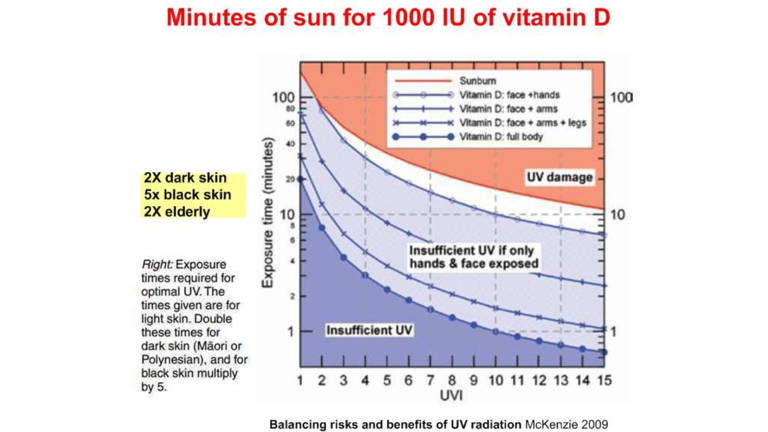THIS WILL CHANGE THE WAY YOU LOOK AT GETTING ENOUGH VITAMIN D
The sun is out again 😊, and the summer is well and truly here! All our cells are dancing with joy as they get extra doses of vitamin D this weekend and for the next 3 months (fingers crossed), that will help our cells communicate, grow and flourish… There’s a reason why we all love that feeling of the morning sun shining on your face - your cells love it and are excited to get those nutrients!
How do we know how much sun we need to make enough vitamin D for our bodies? There are 7 main reasons that affect the amount of vitamin D we get from the sun:
1. Skin type
The wonderful melanin or otherwise known as your skin pigmentation. Melanin is a type of pigment that gives colour to your hair, skin, and eyes. When we spend time in the sun we produce more melanin which creates that beautiful tan, but there is a downside as the darker your skin pigmentation the less Vitamin D you will absorb from the sun. Also, don’t forget if it’s still cold and you are wearing a jumper which covers your arms, you won’t make enough. You need to expose that gorgeous skin of yours.
2. Time of day
The optimal time where you're going to get the fastest conversion of that UVB into vitamin-D in your body is the mid-day sun, when the sun is at its peak. The midday sun is the most apt to contribute to conversion – so try and get out between 12-3pm.
3. Location, location, location
Ever wondered why you love the sun so much more when you are on holiday? Well, the 37th Parallel might have something to do with it. Sounds strange and complicated but it is simply a line drawn on the map where above it you are going to be too far away from the sun (even if it is sunny) to make Vitamin D from the sun for 6+ months of the year. So, it might be time to emigrate below the line, or if easier just take a tonic 😊
4. Time of year
A pathologist named Dr. Ryan Cole said, "There is no such thing as cold and flu season, there is only low vitamin D season” which is a theory that is gaining a lot of traction around the world about why viruses are so seasonal. So, think about it like this, it’s almost impossible to avoid viruses entirely as there are over a billion in most rooms in your house, the trick is having an optimally fuelled immune system to keep the bad ones at bay.
5. Pollution
A study published in the journal Nature Reviews, Endocrinology, determined that air pollution can be a causative agent in vitamin D deficiency. It’s not so much what the sun is doing, it's that in big cities we're creating an environment where pollution is blocking some of the sun’s beneficial rays from interacting with our bodies normally. So, if you live in a city, consider taking Vit D all year round.
6. Age
Another factor that can decrease our skin's ability to make Vitamin D by interacting with the sun is age. We have photoreceptors in our skin that literally read and pick up light, so as we age that interaction can get a little bit off and be less effective.
7. Sunscreen
This one is a little controversial as we’ve forever been told to wear sunscreen. But it does block out Vitamin D absorption too. So, keep in mind that we do want to have some sun exposure without sunscreen. We aren’t saying bake yourself, but without sunscreen is the most efficient and effective natural way to make Vitamin D.
So, we all make Vitamin D at different rates and in varying degrees, so supplementing can be a good idea all year round if you are affected significantly by any of the above. But, what about this weekend?
Well, the met office solar UV forecast has England producing the most rays for making vitamin D between 12-3pm on both Sunday and Monday with an average of 7 on the index. So, in order to make 1000IU or 25mcg of Vitamin D all you need to do is get your face and arms in the sun for 10 minutes and you will be making your daily dose. Remember though that if you are working from inside during the week, it means you’ll unlikely be making any vitamin D unless you take a nice 20-minute lunchtime stroll.
See the chart below for a handy calculation guide which also considers how much skin you have exposed and the pigmentation of skin.









